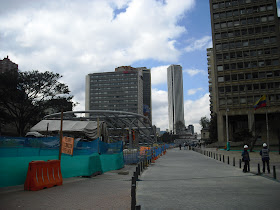Colombians have many things to be proud of in terms of their country. For one, a stunningly diverse landscape – from dense jungle to sparse deserts, serene coastal settings to entrancing rolling hills leading to snow-capped mountains and much more in between. With such a contrasting topography comes an array of different and colourful flora and fauna – it is one of the most diverse places on the planet.
Add to this a largely helpful, welcoming populace – at least initially* – with an easy-going nature and you begin to see why many of the locals speak very highly of their land and its people.
 |
| Unspoilt beauty. |
Indeed, for those of us who are uneasy with gushing praise in any context, such talk from some Colombians about their hallowed place, which can often descend into hyperbole, can become a little unsettling. We can all get carried away, though, from time to time.
In this regard, bearing in mind the number of locals we’ve met who won’t hear a bad word said about the country, it can be a tad refreshing to hear some born-and-bred Colombians speak in not-so-glowing terms about their homeland. A bit of balance brought to proceedings, in a sense.
Perhaps for every ten natives we meet that fall into the ‘Colombia can do no wrong’ category, we encounter about three that, if not utterly critical of the place, are certainly more focused towards its faults.
The truth – if such a thing can even be measured in this context – generally falls somewhere in between. The fact that our prime residence throughout our time in Colombia has been in the nation’s capital and largest city, Bogotá, helps to explain in some part our encounters with the more ‘negative’ (or is that realist?) elements.
Many of them are not Bogotanos, generally hailing from warmer, less crowded and, usually, environmentally cleaner parts of the country. They had to relocate to the metropolis in order to study or find work – nothing unique there, of course; an internal population flow to a country’s biggest, economically most important, city.
The majority of these Bogotá ‘blow-ins’, though, would generally prefer to be living elsewhere, back in their place of birth for one, and this contributes to the ill feeling many of them develop towards their country.
As mentioned, most of them come from warmer locations, so the relatively chilly Bogotá nights don’t help in building a ‘loving’ relationship with the capital either.
In this regard, bearing in mind the number of locals we’ve met who won’t hear a bad word said about the country, it can be a tad refreshing to hear some born-and-bred Colombians speak in not-so-glowing terms about their homeland. A bit of balance brought to proceedings, in a sense.
Perhaps for every ten natives we meet that fall into the ‘Colombia can do no wrong’ category, we encounter about three that, if not utterly critical of the place, are certainly more focused towards its faults.
The truth – if such a thing can even be measured in this context – generally falls somewhere in between. The fact that our prime residence throughout our time in Colombia has been in the nation’s capital and largest city, Bogotá, helps to explain in some part our encounters with the more ‘negative’ (or is that realist?) elements.
Many of them are not Bogotanos, generally hailing from warmer, less crowded and, usually, environmentally cleaner parts of the country. They had to relocate to the metropolis in order to study or find work – nothing unique there, of course; an internal population flow to a country’s biggest, economically most important, city.
The majority of these Bogotá ‘blow-ins’, though, would generally prefer to be living elsewhere, back in their place of birth for one, and this contributes to the ill feeling many of them develop towards their country.
 |
| Eating on the job. |
The minus points thus start to grow; unfriendly, untrustworthy people – a big contrast with the official line that – disorganised, backwards, dangerous. In some of the conversations we’ve had with these dissenters, an actual hatred is palpable.
Again, though – the disorganised, backward labels apart – such feelings, especially of unfriendliness, are commonplace in many heavily populated cities across the globe. You tend to get a truer reflection of the soundness of a country and its people outside of the big urban centres; and in this regard, Colombia scores relatively well from what we’ve experienced and written about.**
Another aspect of what we’ll call a more rounded appraisal of the country is what Colombians now living abroad say about the place. In a recent book-editing project we undertook which featured interviews with such types, there were some common observations made.
Chief among those was the work ethic – or lack thereof, to be honest – of their compatriots back home. Now, on face value, this may surprise some people who visit the major Colombian cities. The locals generally rise very early to go to their place of employment and return pretty late – 12-hour plus days are commonplace here. There is a difference, though, between being at work and actually doing work.
As their fellow nationals, now plying their trade outside these borders, noted, there exists a more 'relaxed' approach to getting things done here. A ‘What’s the rush?’ style mentality you might call it.
Again, though – the disorganised, backward labels apart – such feelings, especially of unfriendliness, are commonplace in many heavily populated cities across the globe. You tend to get a truer reflection of the soundness of a country and its people outside of the big urban centres; and in this regard, Colombia scores relatively well from what we’ve experienced and written about.**
Another aspect of what we’ll call a more rounded appraisal of the country is what Colombians now living abroad say about the place. In a recent book-editing project we undertook which featured interviews with such types, there were some common observations made.
Chief among those was the work ethic – or lack thereof, to be honest – of their compatriots back home. Now, on face value, this may surprise some people who visit the major Colombian cities. The locals generally rise very early to go to their place of employment and return pretty late – 12-hour plus days are commonplace here. There is a difference, though, between being at work and actually doing work.
As their fellow nationals, now plying their trade outside these borders, noted, there exists a more 'relaxed' approach to getting things done here. A ‘What’s the rush?’ style mentality you might call it.
You only need to look at the ongoing infrastructure works in downtown Bogotá to get an idea of this – they’ve been at it since before our first visit here in early 2009 and there still seems to be no end in sight. Sure it’s only the capital’s city centre.
We’re all on for having a more laid-back life, but when you’re still spending most of your time at your place of work but just not doing a lot, that doesn’t sound like much fun. For our Colombian expat interviewees who have discovered the art of efficiency elsewhere, coming back to the typical way of doing things in the old country is something they’re not too keen on.
Yet despite the faults and oft-frustrating idiosyncrasies of the country and its people, for us, the many plus points outweigh the bad. It’s why we’re still here we guess.***
For some of the locals, however, getting out of the place can’t come quick enough.
 |
| Never-ending works. |
We’re all on for having a more laid-back life, but when you’re still spending most of your time at your place of work but just not doing a lot, that doesn’t sound like much fun. For our Colombian expat interviewees who have discovered the art of efficiency elsewhere, coming back to the typical way of doing things in the old country is something they’re not too keen on.
Yet despite the faults and oft-frustrating idiosyncrasies of the country and its people, for us, the many plus points outweigh the bad. It’s why we’re still here we guess.***
For some of the locals, however, getting out of the place can’t come quick enough.
Sometimes, to truly appreciate your birthplace, you need to leave it – if only for a short time. You might find, though, that the grass is indeed greener on the other side.
______________________
*For our take on some of the less positive aspects of Colombian friendships, see http://bit.ly/LbcE9V
**A host of previous posts to choose from in this regards, including 'Finding Filandia' http://bit.ly/W1qXDw, 'Buenaventura's dirty delights' http://bit.ly/11ksFmP, 'Dirty Old Town' http://bit.ly/VG94Ho and 'Turbo Living' http://bit.ly/SVtkWW
***We did address this in some way in 'Por qué Colombia?' http://bit.ly/W1t3DF
*For our take on some of the less positive aspects of Colombian friendships, see http://bit.ly/LbcE9V
**A host of previous posts to choose from in this regards, including 'Finding Filandia' http://bit.ly/W1qXDw, 'Buenaventura's dirty delights' http://bit.ly/11ksFmP, 'Dirty Old Town' http://bit.ly/VG94Ho and 'Turbo Living' http://bit.ly/SVtkWW
***We did address this in some way in 'Por qué Colombia?' http://bit.ly/W1t3DF
Nice article WW!
ReplyDeleteThanks as ever for reading & commenting Robin. Perhaps the 'Colombia's Locas' story from a few months back might resonate with you these days?!
DeleteNot exactly a dissenting article, this blog highlights some other curious points of interest of colombian culture from a foreigner´s, and in particular, an Irishman´s, point of view. It´s lighthearted but true.
ReplyDeletehttp://tornpantsbloodyhands.blogspot.com/2013/03/9asuntosporcolombianosenirlanda.html
When did you get that up-and-running Marty?!!
DeleteGood stuff - when I've more time I'll go through it in more detail. Reading Spanish takes a bit more of an effort, you know!
I think there's a facility to link blogs on this thing, so I can do that too...
Wow!doosan colombia is a beautiful country. Many people didn't notice their rich natural resources. Maybe I can convince my wife to take a vacation there next year.
ReplyDeleteIt's certainly worth a visit Galen! Let us know if you decide to come here!
ReplyDelete